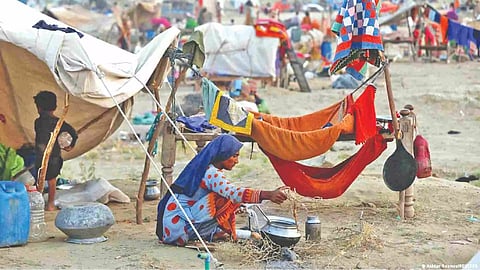

Diplomats from around the globe will meet in the German city of Bonn this week to hash out plans that are key to global efforts to stop the planet heating and adapt to violent weather. The little-known talks, which take place each year ahead of the United Nations landmark COP climate summits, lay the groundwork for humanity’s response to global warming. Negotiators from across the world will agree on technical details about how to cut pollution, protect people from a hotter and more hostile environment, and move money to pay for it. It will clear the way for bigger political fights at the COP28 conference in the United Arab Emirates in November.
The meeting in Bonn gives officials a space both to talk about the outcome of the climate summit and figure out what is and what’s not working in their climate policy, said Alex Scott, a diplomacy expert at the climate think tank E3G in London. “The thing that’s different about Bonn is that the politicians aren’t there — or very few of them are.”
The Bonn conference is the first time climate diplomats will have come together since COP27 — a tense summit in Egypt last year where world leaders agreed to set up a fund to pay poor countries for some of the damage wrought by extreme weather. The last-minute deal was a landmark step in rich countries taking responsibility for their carbon pollution. But many countries were left frustrated by the weak decisions on climate mitigation — actions to cut planet-heating emissions — that came out of the summit. “We got agreement on the new fund,” said Marjo Nummelin, Finland’s lead climate negotiator. “But we really do think that we cannot have another COP where there is no real progress on the mitigation agenda.”
Even the fund’s future is uncertain. Before any money changes hands, countries will have to agree who will pay, who will get money, how much will be sent, and under which circumstances. Some of the work for that will start in Bonn, but the political arguments will be left until later this year. “My expectation out of Bonn is that at least we are going to have an informal note,” said Juan Carlos Monterrey, a former chief climate negotiator for Panama who now works for Geoversity, an educational charity trying to save wildlife. “And an informal note is literally — as it sounds — just a note with no standing that collects the vision, the positions of the different parties and groups.”
For some countries on the frontlines of climate change, battling scorching heat waves and watching homes wash away as sea levels rise, fixing those issues on paper is no guarantee of cash. Rich countries broke a promise made in 2009 to get poor ones $100 billion a year in grants and loans by 2020. Unlike the new fund, which will help countries recover from bad weather, this money was supposed to help them cut carbon pollution and adapt to bad weather.
Some analysts expect they will hit the target in 2023, three years later than planned, though data to check this will only be available in the following years. In any case, scientists say, the money promised was never enough to begin with. Negotiators in Bonn will discuss a new climate finance target for after 2025.
The UN will also check progress toward climate goals during the conference. Its global stocktake, a two-year review of humanity’s response to climate change, will move into its final phase in Bonn this month before being published ahead of COP28 in November.